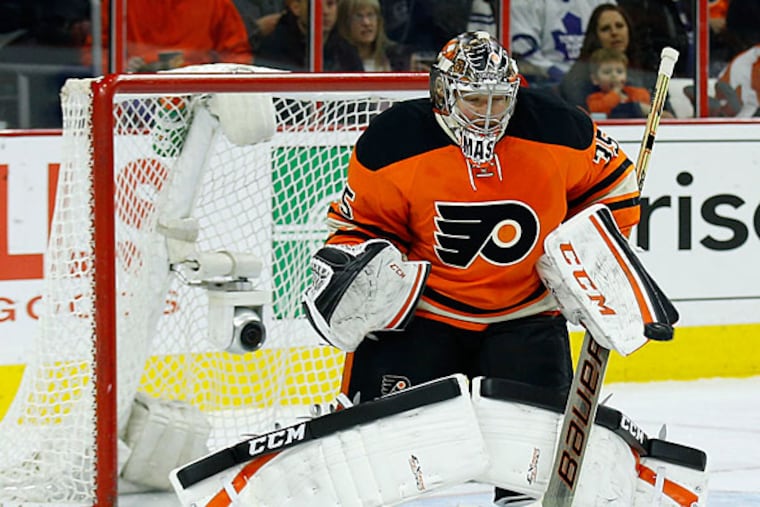Hockey shot-blocking not always a good thing
Flyers goalie Steve Mason lets his defensemen know which shots they can try to block and which ones to let him stop.

STEVE MASON isn't exactly shy.
When a New York Islander pulls back to unleash a slap shot tonight, chances are if you're listening close enough, you'll hear Mason barking commands like a platoon sergeant.
"I'm pretty vocal," Mason said. "When I don't want someone in my way, I'll be yelling at them to move it."
There are two caveats, though, to what Mason calls the "art of shot-blocking." He will only ask his teammates to move if there is enough time. And the cardinal rule to defensemen is: If you're going to block it, don't do it halfway.
"Communication is a huge thing. As much as I have to be vocal, they have to be listening, too," Mason said. "I'll say something as long as they hear me in time. You don't want them moving at the last second, because then if I can't pick it up quick enough, odds are it's going to go right into the net.
"I'll be yelling at them to get out of the way so I can take a shot. I'd much rather myself stop it than potentially they miss it or it deflects off them. There's a time and place for blocked shots. You don't want to overdo it."
The Flyers are blocking fewer shots than they have in recent years. They rank 14th in the NHL this season with 730 blocks through 51 games.
Part of that is due to Mason, who seems to lean more toward enjoying his own space to track pucks, and part of that is in the Flyers' structure. With Craig Berube placing such a heavy emphasis on strong defensive gaps, less room exists for teams to crank shots off the rush.
Few players appreciate the freedom to roam more than defenseman Andrew MacDonald, who blocked 31 more shots (242 total) than any player in the NHL last season. Since signing a 6-year, $30 million deal with the Flyers last spring, MacDonald is now sixth on the Flyers, a full 43 behind team leader Nick Schultz.
MacDonald, 28, has not finished ranked lower than fifth league-wide in blocked shots since the 2011-12 season.
While some might point to his sparkling new contract - which represents a 10-times raise over his previous annual salary of $550,000 - as a reason for stepping in front of fewer shots, that would not be the case. It also doesn't have anything to do with the right knee injury he suffered in late October. Or, the fact that he's playing home games in a different arena now, with different stat collectors employed by the league.
The marked decrease in stats is instead another example of how differently the Flyers are deploying MacDonald than the Islanders. He isn't supposed to do the yeoman work; he is supposed to be the diligent puck mover making plays.
"I think it's more of how they want me to play," MacDonald said. "I think over the past 2 years, I played a lot of penalty kill out there in the first unit. You're going to get a lot of blocks on the'kill. They want me to be more aggressive here, so I think the opportunity to block is a little less."
That isn't to say the Flyers aren't interested in blocking shots. All teams crave a key block, particularly on the penalty kill.
"We just emphasize a lot on gaps," MacDonald said. "Me personally, I notice a lot of the shots I'd been able to block over the years were coming off the rush. I'd get a stick on it or get in front of it a lot. Now, there's more emphasis on gapping up. Players want to make plays, too. They turn up a lot, they drive to the net a lot. It's kind of all circumstantial."
Under Peter Laviolette, the Flyers averaged a sixth-place ranking in the NHL in blocked shots. They were at such a premium that Ilya Bryzgalov would often complain - even though that isn't too much of a surprise - that his defensemen were making his job harder.
"When you have communication, it makes it much more predictable for a goalie," MacDonald said. "It's literally a split second. A lot of times, it's instinct to just jump in front of a shot. As soon as we hear [Mason] make a call, we have to look around for someone to box out."
MacDonald definitely isn't complaining about fewer chunks of frozen vulcanized rubber screaming his way at 100 mph.
"It's definitely a lot easier," MacDonald said. "You feel healthier, whatever the new 'healthy' is. As the year goes on, your '100 percent' range changes. That being said, you never think about that. If the situation arises, you get in the lane, no questions asked. You're not sitting there thinking, 'Ah, I'm going to save myself.' "
Slap shots
Defenseman Nick Grossmann (right shoulder) is expected to return tonight, replacing Carlo Colaiacovo . . . Braydon Coburn (left foot) skated before practice yesterday for the first time since Jan. 12 . . . Two different shots caught Steve Mason in an awkward spot under his chest protector yesterday, but he seemed unfazed. "Just part of being a goalie," Mason said . . . The Islanders have lost three of four since losing forward Kyle Okposo (detached retina); Okposo could miss up to 2 months . . . The Flyers said they would be ready for New York's speedy penalty kill, which leads the league with eight shorthanded goals . . . Michael Raffl (pneumonia) was back in the workout room yesterday, wearing a mask to prevent the spread of germs, according to a photo he posted on social media.